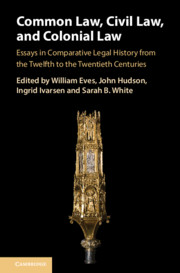CUP is publishing an edited
collection on comparative legal history form the 12th-20th
centuries.
ABOUT THE BOOK
Common Law, Civil Law, and
Colonial Law builds upon the legal historian F.W. Maitland's famous observation
that history involves comparison, and that those who ignore every system but
their own 'hardly came in sight of the idea of legal history'. The extensive
introduction addresses the intellectual challenges posed by comparative
approaches to legal history. This is followed by twelve essays derived from
papers delivered at the 24th British Legal History Conference. These essays
explore patterns in legal norms, processes, and practice across an
exceptionally broad chronological and geographical range. Carefully selected to
provide a network of inter-connections, they contribute to our better
understanding of legal history by combining depth of analysis with historical
contextualization. This title is also available as Open Access on Cambridge
Core.
ABOUT THE EDITORS
William Eves, University of St
Andrews, Scotland
William Eves is a Research Fellow
at the University of St Andrews who has published on law and legal procedure in
England during the twelfth and thirteenth centuries
John Hudson, University of St
Andrews, Scotland
John Hudson is Professor of Legal
History at the University of St Andrews and an L. Bates Lea Global Law
Professor at Michigan Law. His books include The Formation of the English
Common Law (expanded edn., 2017) and The Oxford History of the Laws of England,
II: 871-1216 (2012). He is a Fellow of the British Academy.
Ingrid Ivarsen, University of
Cambridge
Ingrid Ivarsen is a Junior
Research Fellow at Emmanuel College, University of Cambridge. She has published
on language and law in Anglo-Saxon England.
Sarah B. White, University of St
Andrews, Scotland
Sarah B. White is a Research
Fellow at the University of St Andrews. She has published on ecclesiastical and
legal history, specifically argument and procedure, in England in the twelfth
and thirteenth centuries. She is a Fellow of the Higher Education Academy.
TABLE OF CONTENTS
Introduction: Situating,
researching and writing comparative legal History John Hudson and William Eves
1 'In aliquibus locis est
consuetudo': French lawyers and the Lombard customs of Fiefs in the
mid-thirteenth century Attilio Stella
2. What does Regiam maiestatem
actually say (and what does it mean)? Alice Taylor
3. James VI and I, rex et iudex:
One king as judge in two kingdoms Ian Williams
4. George Harris and the comparative
legal background of the first English translation of Justinian's Institutes
Łukasz Jan Korporowicz
5. The nature of custom: Legal
science and comparative legal History in Blackstone's commentaries Andrew J.
Cecchinato
6. Through a glass darkly: English
common law seen through the lens of the Göttingische gelehrte Anzeigen
(Eighteenth century) Carsten Fischer
7. Looking afresh at the French
roots of continuous easements in English law Ciara Kennefick
8. Case law in Germany: The
significance of Seuffert's Archiv Clara Günzl
9. Leone Levi (1821–1888) and the
History of comparative commercial law Annamaria Monti
10. Radical title of the crown
and aboriginal Title: North America 1763, New South Wales 1788 and New Zealand
1840 David V. Williams
11. The High Court of Australia
at mid-century: Concealed frustrations, private advocacy and the break with
English Law Tanya Josev
12. English societal laws as the
origins of the comprehensive slave laws of the British West Indies Justine
Collins.
More info here


No comments:
Post a Comment